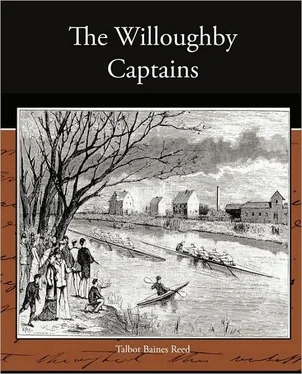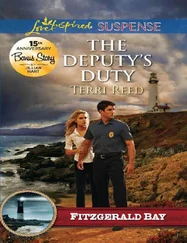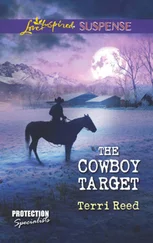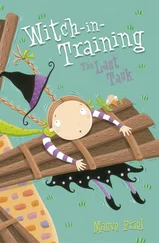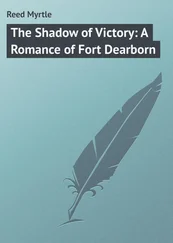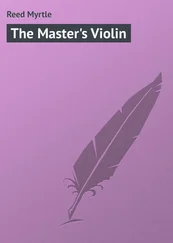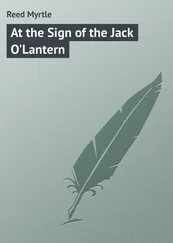Parson knew them yards away. They were rowdies of Welch’s house, and he groaned inwardly at the prospect before him. The boy steering was our old acquaintance Pilbury, and as his boat approached he shouted out cheerily, “Hullo, there, Parson! mind your eye! We’ll race you in — give you ten yards and bump you in twenty! Pull away, you fellows! One, two, three, gun! Off you go! Oh, well rowed, my boat! Now you’ve got him! Wire in, now! Smash him up! scrunch him into the bank! Hooroo! two to one on us! Lay on to it, you fellows; he can’t go straight! Six more strokes and you’re into him! One, two, three — ha, ha! he’s funking it! — four, five — now a good one for the last — six! Hooroo! bump to us! Welch’s for ever!”
So saying, the hostile boat came full tilt on to the stern of the Parrett’s tub, and the outraged Parson found himself next moment sprawling on his back, with the nose of his boat firmly wedged into the clay bank of the river, while his insulting adversaries sped gaily away down stream, making the morning hideous with their shouts and laughter.
This little incident, as may be supposed, did not tend to compose the fluttered spirits of the unhappy Frederick. To say nothing of the indignity of being deliberately run down and screwed into the bank by a crew of young “Welchers,” the loss of time involved in extricating his boat from the muddy obstacle which held her by the nose, put all chance of getting in in time to go round to Chalker’s before chapel out of the question. Indeed, it looked very like a shut-out from chapel too, and that meant no end of a row.
By a super-human effort he got his boat clear, and sculled down hard all, reaching the boat-house at seven minutes to eight. He had just presence of mind enough to shout the message for Chalker to the boat-boy, with a promise of twopence if he delivered it at once; and then with a desperate rush he just succeeded in reaching the chapel and squeezing himself in at the door as the bell ceased ringing.
Chapel was not, under the circumstances, a very edifying service to Parson that morning. His frame of mind was not devotional, and his feelings of bottled-up wrath at what was past, and dejected anticipation of what was to come, left between them no room for interest in or meaning for the words in which his schoolfellows were joining. The only satisfaction morning prayers brought to him was that, for ten minutes at least, no one could harry him; and that at least was something to be grateful for.
Morning chapel at Willoughby was supposed to be at 7:15, and was at 7:15 all the months of the year except May, June, and July, when, in consideration of the early-morning rowing and bathing, it was postponed for three-quarters of an hour — a concession made up for by the sacrifice of the usual half-hour’s interval between breakfast and first lesson.
This arrangement was all against Parson, who, if the half-hour had been still available, could at least have skimmed through his Caesar, and perhaps have begged a friend to help him with the French verbs, and possibly even have had it out with Pilbury for his morning’s diversion. As it was, there was no opportunity for the performance of any one of these duties, and at the sound of the pitiless bell he slunk into first lesson, feeling himself a doomed man.
His one hope was Telson. Telson sat next him in class, and, he knew well, would help him if he could.
“Telson,” he groaned, directly he found himself beside his faithful ally, “I’ve not looked at it!”
Telson whistled. “There’ll be a row,” he muttered, consolingly; “it’s a jolly hard bit.”
“Haven’t you got the crib?”
Telson looked uncomfortable. “Riddell caught me with it and made me give it up.”
“What on earth business has Riddell with your cribs, I’d like to know?” exclaimed Parson, indignant, not at all on the question of morality, but because the last straw on which he had relied for scrambling through his Caesar had failed him.
“He didn’t take it, but he advised me to give it up.”
“And you were fool enough to give in to him?”
“Well, he made out it wasn’t honourable to use cribs,” said Telson.
“Grandmother!” snarled Parson. “Why, Telson, I didn’t think you’d have been such a soft!”
“No more did I, but somehow — oh! I’m awfully sorry, old man; I’ll try and get it back.”
“Doesn’t much matter,” said Parson, resignedly. “I’m in for it hot to-day.”
“I’ll prompt you all I can,” said the repentant Telson.
“Thanks; I’d do the same to you if I could,” replied Parson.
“It is a long lane that has no turning,” as the proverb says, and Parson, after all, was destined to enjoy one brief glimpse of the smiles of fortune that day. The first boy put up to translate stumbled over a somewhat intricate point of syntax. Now Mr Warton, the master — as the manner of many masters is — was writing a little book on Latin Syntax, and this particular passage happened to be a superb example of a certain style of construction which till this moment had escaped his notice. Delighted with the discovery, he launched out into a short lecture on the subject generally, citing all the examples he had already got in his book, and comparing them with other forms of construction to be found scattered through the entire range of Latin classical literature.
How Parson and Telson enjoyed that lecture! They listened to it with rapt attention with hearts full of gratitude and faces full of sympathy. They did not understand a word of it, but a chapter out of “Midshipman Easy” could not have delighted them more; and when they saw that the clock had slowly worked round from nine to ten they would not have interrupted it for the world.
“Ah!” said Mr Warton, taking out his watch, “I see time’s up. We’ve had more Syntax than Caesar to-day. Never mind, it’s a point worth remarking, and sure to be useful as you get on in Latin. The class is dismissed.”
Little he knew the joy his words carried to two small hearts in his audience.
“Jolly good luck that!” said Parson, as he strolled out into the passage arm-in-arm with his friend. “Now if I can only get those beastly verbs done before Coates asks for them! I say, Telson, do you know the dodge for sticking three nibs on one pen and writing three lines all at one time?”
“Tried it once,” said Telson, “but it didn’t pay. It took longer to keep sticking them in when they fell out, and measuring them to write on the lines, than to write the thing twice over the ordinary way. I’ll write out part, old man.”
“Thanks, Telson, you’re an awful brick. I suppose Riddell wouldn’t think it wicked of you to write another fellow’s impot, would he?”
“I half fancy he would; but I won’t tell him. Hullo! though, here comes Coates.”
A monitor wearing his “mortar-board” approached.
“Where’s your imposition, Parson?” he asked.
“I’m awfully sorry,” said Parson, “but it’s not quite done yet, Coates.”
“How much is done?” demanded Coates.
“Not any yet,” said Parson, with some confusion. “I was just going to begin. Wasn’t I, Telson?”
“Won’t do,” said Coates; “you were up the river this morning, I saw you. If you can go up the river you can do your impositions. Better come with me to the captain.”
Coming with a monitor to the captain meant something unpleasant. The discipline of Willoughby, particularly in outside matters, was left almost entirely in the hands of the monitors, who with the captain, their head, were responsible as a body to the head master for the order of the school. It was very rarely that a case had to go beyond the monitors, whose authority was usually sufficient to enable them to deal summarily with all ordinary offenders.
Читать дальше
